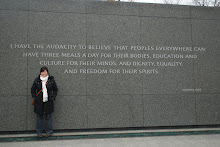
Wonderful to see my sister-friends from Year One of the Abundant Table this past weekend! Good times singing, tamale making, and salsa dancing. What a beautiful group of women who are making something wonderful with their lives.

Last night at the Abundant Table worship service, we talked about sacred places. "What place is sacred to you?" was our art prompt, and we each drew pictures - an orchard, a special doorway, a carwash, a church, a farm. Each person had a different place, and together, these pictures of places that we all placed on our altar showed that every place on Earth is sacred space.
In light of this, I've been thinking of the Keystone XL pipeline, a 1,700-mile oil pipeline that TransCanada, a Canadian oil company plans to build from Alberta, Canada, to the oil refineries near the Gulf of Mexico. It would pump crude oil through beautiful American wilderness and farmland. Acres of Canadian boreal forests have already been destroyed by the oil extraction process.
This pipeline will destroy countless sacred places, and cause more destruction through global warming. See this link (http://www.tarsandsaction.org/) to sign a petition asking President Obama to reject the requested permit to proceed. He will make a decision in the next week or two. And, if you live out East, consider joining hundreds of people, including religious leaders and scientists, who are sitting in front of the White House in peaceful protest of violence against our country. Let's take a stand for God's good and sacred Creation.
For more information on the pipeline, see this New York Times Editorial.
 Leeks
Leeks Two sticks in drifted snow
mark the trench where I laid the leeks
in cool dirt in October.
Now I dig down through old
frozen crust to damp dark hay
to the thick grey green leaves
of the leeks and pull them
from the piled earth and
shake dirt from their white
hairy roots. They come up
like creatures from under
the ocean. In the half-cold,
half-light the odor of earth
gone all these long months
wraps around me, and it is as if
these leeks have come from
a world where there are great
pleasures of the body, where
the mind grows smaller, where
libraries mold in the dark,
where worms in purple and brown
rule the streets, and the corridors
of power are moist and rich
in a way that radio voices
can’t conceive of, and the talk
is of the thick trunk
of seasons, the nose
of rootedness, the eye
that works its way through,
hair that feels its way,
the skull that follows,
the toad of desire, the beetle
of bone density, the grub
of grief, the larva of longing,
the moon coming up and the quiet
at the end of February.
I pick up the pile of leeks
and carry them to the kitchen.
I wash them clean. I chop them
on the old board. I cook them
in oil and salt. I taste
their great sweetness. I remember
that the earth will hum into spring.
by Elizabeth Alexander
Each day we go about our business,
walking past each other, catching each other's
eyes or not, about to speak or speaking.
All about us is noise. All about us is
noise and bramble, thorn and din, each
one of our ancestors on our tongues.
Someone is stitching up a hem, darning
a hole in a uniform, patching a tire,
repairing the things in need of repair.
Someone is trying to make music somewhere,
with a pair of wooden spoons on an oil drum,
with cello, boom box, harmonica, voice.
A woman and her son wait for the bus.
A farmer considers the changing sky.
A teacher says, Take out your pencils. Begin.
We encounter each other in words, words
spiny or smooth, whispered or declaimed,
words to consider, reconsider.
We cross dirt roads and highways that mark
the will of some one and then others, who said
I need to see what's on the other side.
I know there's something better down the road.
We need to find a place where we are safe.
We walk into that which we cannot yet see.
Say it plain: that many have died for this day.
Sing the names of the dead who brought us here,
who laid the train tracks, raised the bridges,
picked the cotton and the lettuce, built
brick by brick the glittering edifices
they would then keep clean and work inside of.
Praise song for struggle, praise song for the day.
Praise song for every hand-lettered sign,
the figuring-it-out at kitchen tables.
Some live by love thy neighbor as thyself,
others by first do no harm or take no more
than you need. What if the mightiest word is love?
Love beyond marital, filial, national,
love that casts a widening pool of light,
love with no need to pre-empt grievance.
In today's sharp sparkle, this winter air,
any thing can be made, any sentence begun.
On the brink, on the brim, on the cusp,
praise song for walking forward in that light.
 Ella Baker, from the "Americans who Tell the Truth" series
Ella Baker, from the "Americans who Tell the Truth" series
